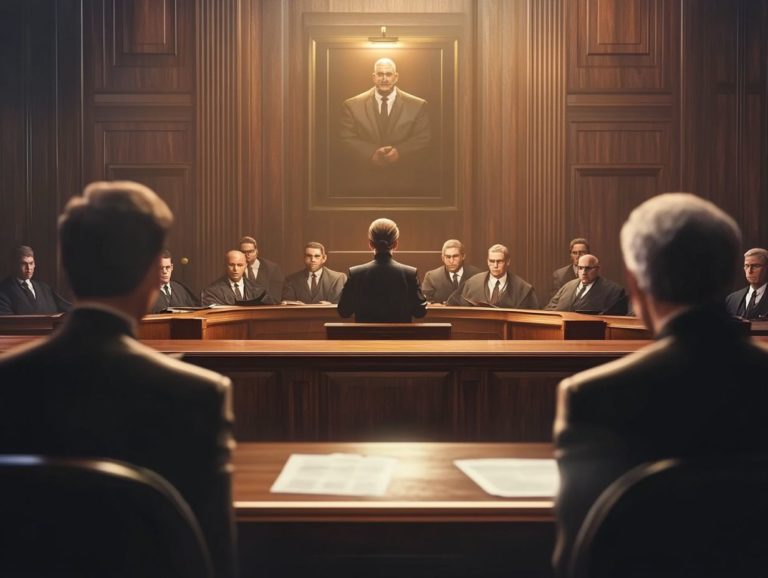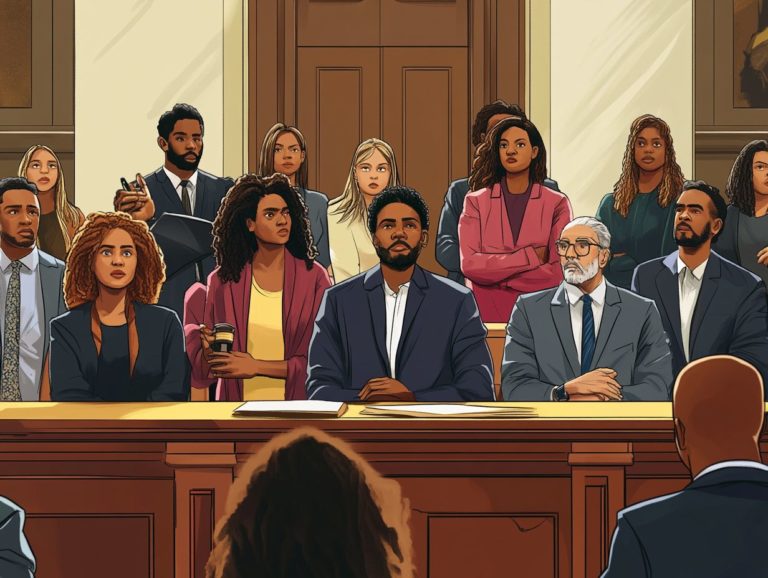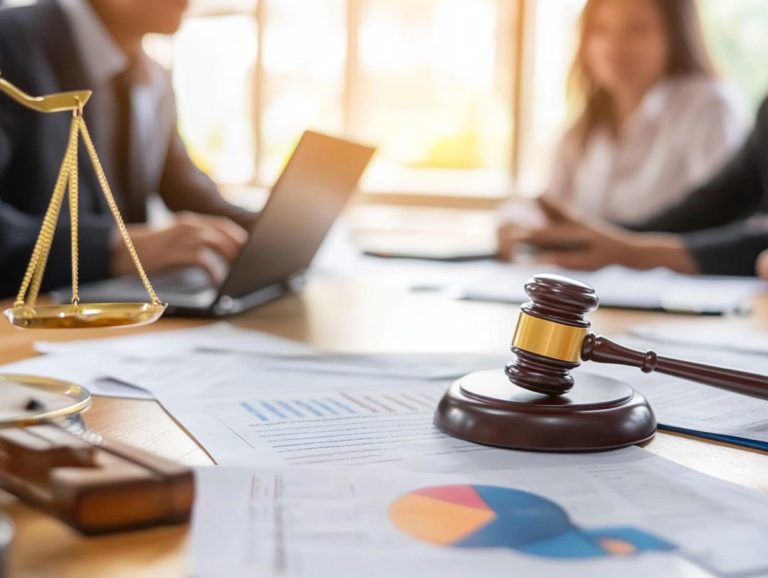Rights of the Accused: Key Takeaways
Understanding the rights of the accused is essential for anyone navigating the legal system. These rights serve as a safeguard for individuals facing charges and uphold the integrity of justice itself.
From the foundational right to a fair trial and legal representation to the right to remain silent and the assurance of due process (fair treatment through the normal judicial system), each element plays a critical role in shaping a just legal landscape. This article delves into these vital rights, illuminating their significance and how they contribute to a fair legal process.
Discover how these rights protect you and why they matter.
Contents
Key Takeaways:
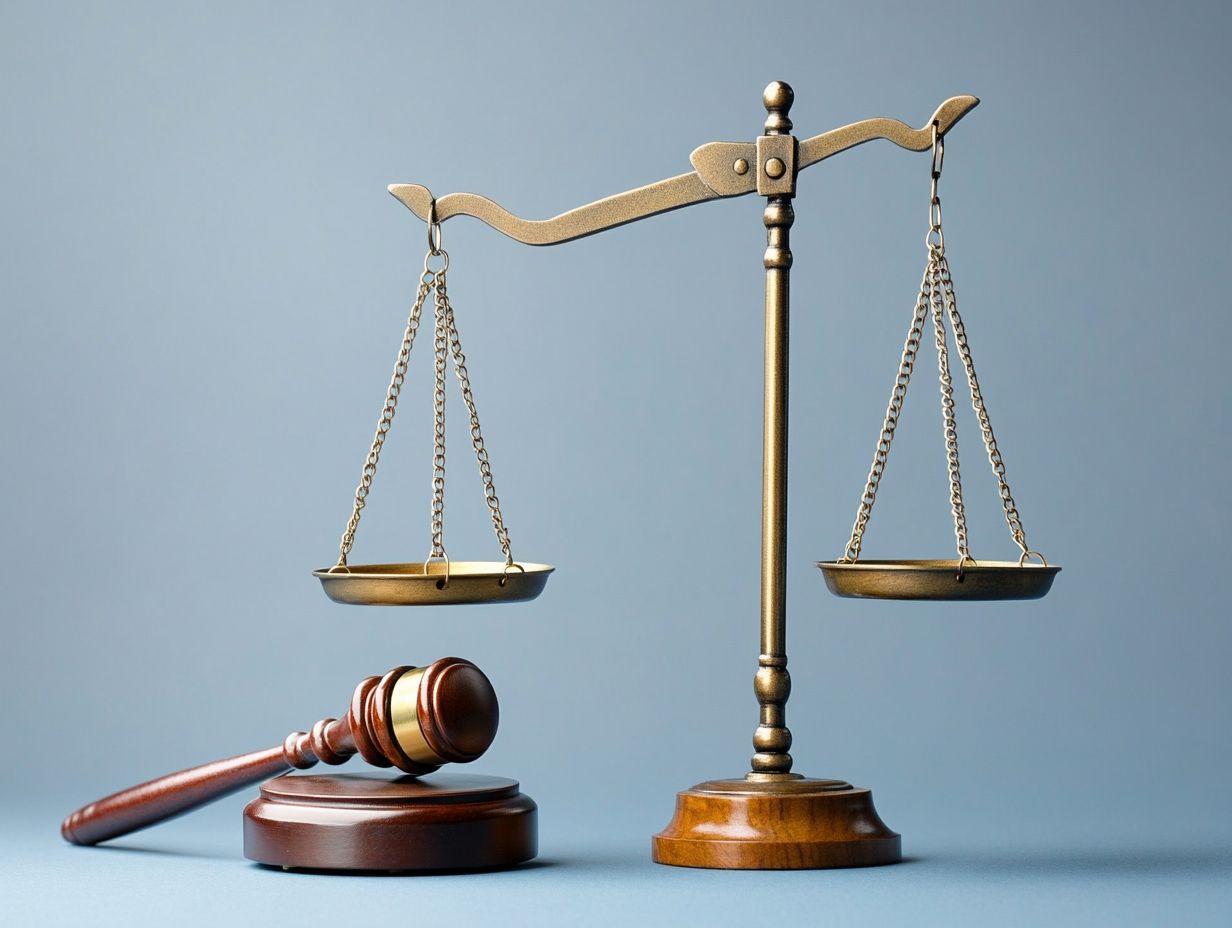
The rights of the accused are crucial in ensuring a fair and just legal system. Key components such as a fair trial, legal representation, and due process are essential for protecting these rights. Understanding what the rights of the accused are, including the rights to remain silent, confront witnesses, and have an impartial jury, is critical for a fair and unbiased trial.
Overview of the Rights of the Accused
The rights of the accused are fundamental protections embedded in the U.S. Constitution, crafted specifically to uphold fairness and justice throughout legal proceedings in our judicial system, as detailed in the top 5 rights of the accused explained.
These rights are rooted in both domestic and international legal frameworks, such as the Universal Declaration of Human Rights, and encompass a range of guarantees designed to shield individuals from unlawful treatment.
They reinforce the principle of due process and secure access to legal counsel, which are crucial for preserving individual rights and civil liberties. This is particularly significant when navigating the complexities of accusations, trials, and potential convictions within the criminal justice system.
What are the Rights of the Accused?
The rights of the accused encompass a range of legal protections designed to ensure fair and just treatment within the judicial system. These essential rights, including the right to a fair trial and an opportunity to present your case before an impartial jury, are foundational to the principle of due process and are detailed in our guide on the rights of the accused.
The right to legal representation guarantees that you can seek the guidance of an attorney, helping you navigate the complexities of the law with confidence. Another crucial element is the protection against self-incrimination, which ensures that you cannot be compelled to testify against yourself, preserving the integrity of your defense.
Together, these rights underscore the importance of individual liberties in upholding justice and maintaining public confidence in the legal system.
The Right to a Fair Trial
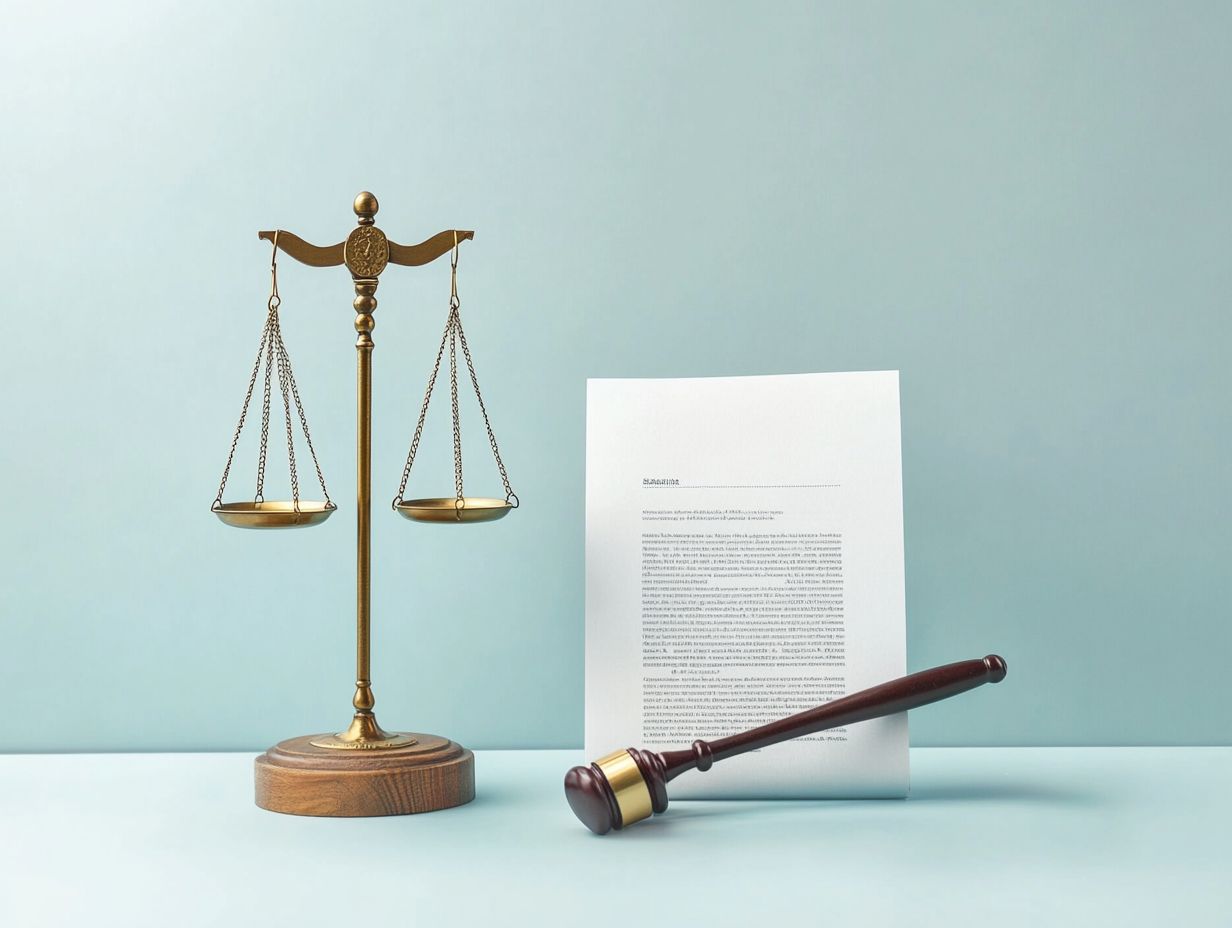
The right to a fair trial stands as a cornerstone of justice within the legal system. It ensures that you, as an individual accused of a crime, are afforded a fair opportunity to defend yourself against the charges brought by the state.
This principle is established in the U.S. Constitution and international legal standards. It encompasses vital elements such as the guarantee of a speedy trial, public access to legal proceedings, and the presence of impartial jurors who can objectively assess evidence and witness testimony without bias.
Upholding this right is crucial for maintaining public trust in the criminal justice system and safeguarding the rights of the accused in appeals.
Key Components of a Fair Trial
- An impartial jury
- The right to legal counsel
- The opportunity for both sides to present evidence and question witnesses
These elements serve as essential pillars of justice, ensuring that you are not only heard but also properly represented. An impartial jury is crucial as it guarantees that decisions are made without bias, fostering trust in the judicial system.
The right to legal counsel enables you to navigate complex legal landscapes, providing the guidance necessary to mount an effective defense. Allowing both parties to present and scrutinize evidence maintains equilibrium, which is vital for uncovering the truth.
Together, these components uphold the fundamental principle of fairness, protecting your rights in legal proceedings and promoting accountability within the justice system.
For more information on your rights or if you or someone you know is facing charges, consider seeking legal advice.
The Right to Legal Representation
If you’re accused of a crime, you have the right to an attorney. This essential right was established by the landmark case Gideon v. Wainwright, emphasizing the role of ethics in rights of the accused.
It ensures you can build a strong defense. Legal help is crucial for navigating the complex judicial system.
Importance of Legal Representation
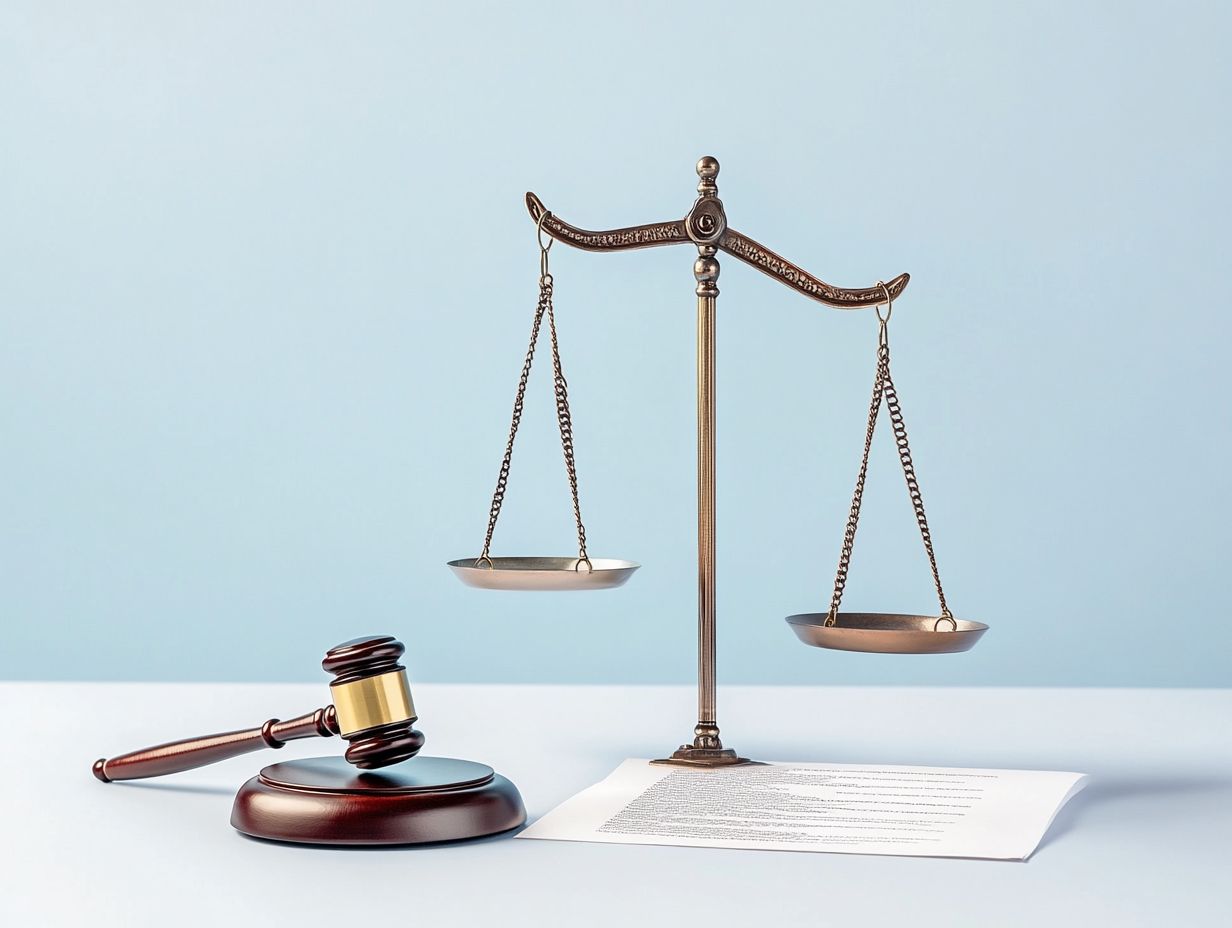
Legal representation is vital for protecting your rights during a trial. It ensures you receive the fairness you deserve under the law.
Attorneys guide you through legal complexities, which can significantly influence the outcome of your case.
Their expertise clarifies intricate legal procedures. It equips you with the necessary tools to mount an effective defense.
A skilled attorney can be the deciding factor between acquittal and conviction. This emphasizes the importance of due process and equal protection under the law.
Accessible legal representation promotes a just legal system for everyone. Don’t wait understand your rights now!
The Right to Remain Silent
The Right to Remain Silent, protected by the Fifth Amendment, shields you from being forced to testify against yourself. This principle is crucial during police interrogations when you should be informed of your Miranda rights.
Knowing these protections is vital for safeguarding your interests. By asserting this right, you uphold the integrity of fairness in legal proceedings.
Understanding the Fifth Amendment
The Fifth Amendment is a cornerstone of the U.S. Constitution. It guarantees essential rights, including protection against self-incrimination.
It also ensures you cannot be deprived of life, liberty, or property without due process. Ratified in 1791, it includes the principle of double jeopardy, preventing you from being tried twice for the same offense.
This amendment addresses government overreach and safeguards your personal freedoms. It reflects the Founding Fathers commitment to a just legal system.
These provisions are significant in legal proceedings, enabling you as the accused to navigate the legal landscape with strong protection against abuses of power.
The Right to Due Process
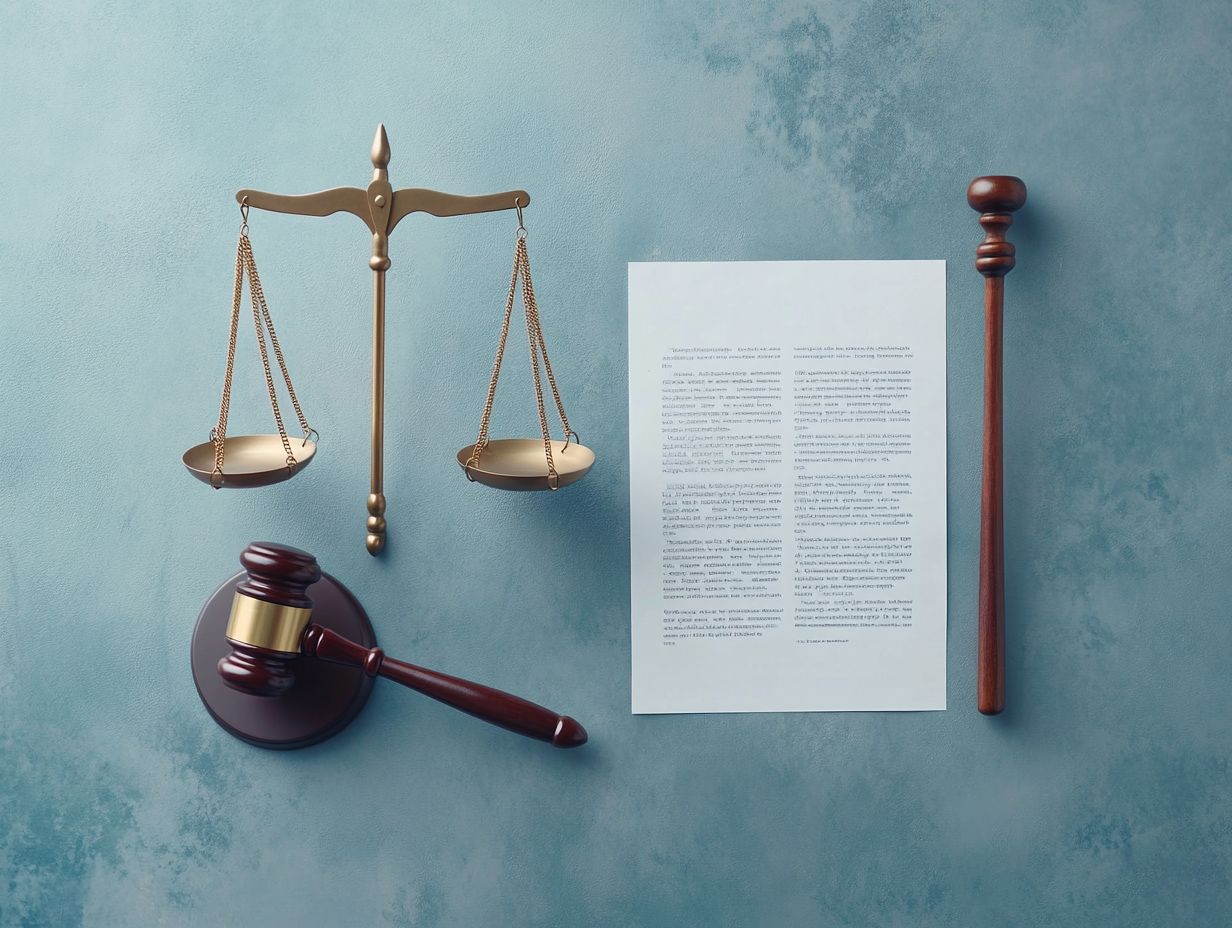
The Right to Due Process ensures you receive fair treatment and justice under the law. This fundamental right is enshrined in the Constitution.
It has been further defined through landmark cases like Mapp v. Ohio and Powell v. Alabama. Due process shields you from arbitrary state actions, ensuring justice is administered fairly.
Upholding due process is vital for maintaining the integrity of the judicial system. It protects the rights of individuals facing accusations.
What is Due Process?
Due process is a principle that mandates the state to honor all rights owed to individuals. It ensures you receive fair treatment within the judicial system.
This concept unfolds in two major forms: substantive and procedural due process.
Substantive due process focuses on the laws themselves, protecting your fundamental rights from government encroachment. Procedural due process ensures fairness in legal proceedings.
The importance of due process cannot be overstated. It safeguards the integrity of the judiciary and ensures you have a fair chance to defend yourself against allegations.
This balance is vital for a just society and reinforces public trust in the legal system.
The Right to an Impartial Jury
The Right to an Impartial Jury is a cornerstone of fair trials. It carefully protects the rights of the accused.
This right ensures the jury is free from bias. This enables them to deliver a just verdict based solely on evidence.
As stated in the Sixth Amendment, this principle is vital for the integrity of our judicial system.
It allows defendants to have their cases heard by a jury of their peers. This prevents individuals from being swayed by external influences or personal prejudices.
Ensuring a Fair and Unbiased Jury
A fair and unbiased jury is essential to uphold the rights of the accused. It maintains public confidence in the judicial process.
This objective relies on mechanisms that assess and promote jury impartiality.
One key process is voir dire, where lawyers and judges ask potential jurors questions. This helps to ensure fairness before selecting jurors for a case.
Juror instructions guide jurors on how to approach evidence without preconceived notions. Lawyers also challenge jurors showing biases, ensuring fair verdicts.
These methods strengthen the integrity of the jury system. They uphold the principles of justice that society depends on.
The Right to Confront Witnesses
The Right to Confront Witnesses is a cornerstone of the criminal justice system. It gives defendants a chance to challenge evidence against them.
This right, grounded in the Sixth Amendment, allows questioning of witnesses. It helps assess their credibility and mount a thorough defense.
By safeguarding this right, the legal system reinforces transparency and accountability.
Cross-Examination and its Importance
Cross-examination allows defendants to question witnesses from the opposing side. This process is essential for safeguarding the rights of the accused.
It tests the credibility of testimony and uncovers the truth behind the facts presented.
By carefully crafting questions, defendants can reveal inconsistencies or biases. This checks every detail of a case and fosters an environment for justice.
Cross-examination boosts fairness in legal proceedings. It protects the interests of all parties involved.
It ensures every voice is heard and examined, leading to a more just outcome.


